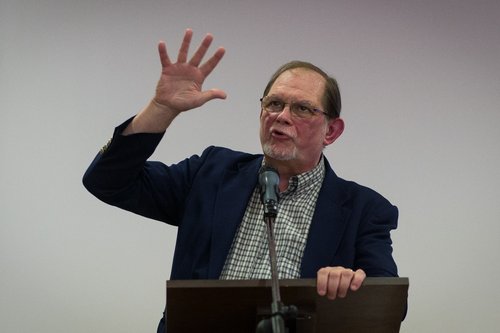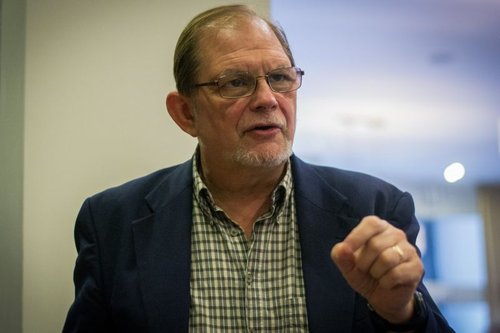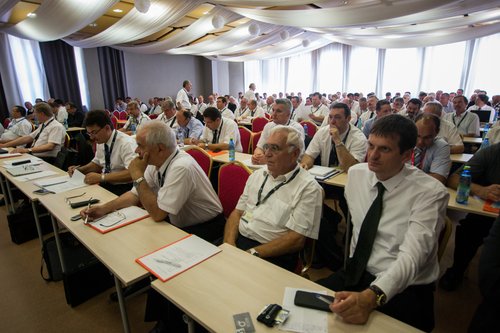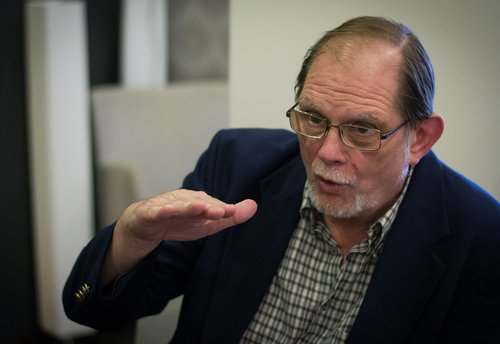Lovingly Challenging
2016. július 12., keddRev Chris Ferguson, General Secretary of the WCRC, was recently invited to address the General Convent of the Hungarian Reformed Churches in Slovakia and then continued on to Budapest to talk with the RCH about ecumenical accompaniment and the vital work of the church in the wider world.
Rev Chris Ferguson, General Secretary of the World Communion of Reformed Churches (WCRC), was recently invited to address the Hungarian Reformed Church’s General Convent held in Kosice, Slovakia. As an ecumenical guest of honor, Rev Ferguson addressed the plenary on matters of joint importance to the HRC and the WCRC, including the upcoming Reformation Jubilee, the plight of refugees, as well as other social justice issues. Other topics touched on included the General Council in Leipzig, Germany, the step to discern whether the WCRC should “affiliate” with the Joint Declaration on the Doctrine of Justification (JDDJ), as well as the inspiring unity of the seven WCRC member churches together in the HRC. After his speech, Rev Ferguson also went on to meet with Bishops and Lay Presidents in attendance. Following his time at the General Convent, Rev Ferguson visited Vizsoly, Hungary, where the first Bible printed in the Hungarian language was created, before heading on to Budapest for a short trip. During his stay in Budapest, Rev Ferguson met with Dóra Kanizsai-Nagy, Head of the Refugee Ministry of RCH, to discuss the vital work in refugee integration that is happening in the capital city. His visit to the region spotlighted WCRC’s mission to be committed to communion and justice and, in partnership with other ecumenical bodies and organizations, participate in God’s mission in the world. Before his trip was done, he sat down with the RCH to talk a bit about his time in Slovakia as well as the challenges he posed to the plenary of the HRC.

How did it feel to participate and to speak at the General Convent of the HRC?
It was very impressive, the meeting itself – the seven churches maintaining, across borders, a strong sense of fellowship and purpose and vision, all seeking a kind of unity. It was fabulous and I thought that was good.
I think the other sense was the space they made to hear about each other’s concerns and issues and problems. I noticed that there was a particular preoccupation to be attentive to the churches that were most vulnerable. There was a lot of interest in what was happening with the church in Ukraine and that was impressive. It wasn’t simply everybody talking about their own needs, but kind of giving the sense that those who had the most needs were particularly listened to – I liked that a lot.
One of the things that I said to them directly is that it was great to take this kind of inspiration and also invite them to make a strong contribution to our upcoming assembly. One of the goals of our assembly that we’ll be talking about more is having gender equality in delegations, and the role of equality between clergy and lay men and women also with a strong youth focus. Of course, with this Reformed Presbyterian form of government it was impressive that there were equal numbers of clergy and lay – all very good – but of course it was also a sea of older men’s faces looking at me and it was clear that although the women are the heart of the church, in leadership they’re not present.
This is something that we challenged them lovingly about on both levels: in terms of participation in our assembly we want and need them to be gender balanced and also in terms of Christ’s call of radical inclusion into the body of Christ. It’s a spiritual issue as well as a practical one, and it’s also a justice issue.

What was the main message in your address to the plenary?
I basically made it very clear that in 2010, when we joined the WARC and REC to make the WCRC, we didn’t just take a new name. We understood that we were going to be a different way of being church, so we called ourselves a Communion in talking about the intentional creation of community.
I made, in various ways, the point of how we need to build our communion together and create a situation where we really take each other into account, because we’re all part of one Reformed family. We need to do that in such a way that the Reformed family understands itself to be just one part of the wider Christian family, and that the wider Christian family understands itself to be part of the human family.
On the point of unity and communion, we also talked about some of the issues that are threatening unity – one of them is that within this family there are churches that have very different positions around human sexuality and that is threatening to divide us. I tried to say that our job isn’t to get everyone together and say that there’s one Reformed point of view, but rather to say that it’s impossible for Reformed Christians to allow differences to divide them around this. Even people who say “That’s somebody else’s issue! Don’t impose conversations about homosexuality or other sexualities on us,” well, it isn’t that easy anymore because the fact of the matter is that our Communion is being broken because people won’t deal with each other. We need to bring resources of scripture and our theological perspective to bear. So, unity, threats to unity, the need to build unity together.
Unity is a major theme, and for our General Council meeting coming up, the theme of which is Living God, Renew and Transform Us, this brings together the context of the celebration of the 500 year anniversary of the Reformation together with the context of the fact that the world is growing, trembling, and shaking. The crisis facing the planet and its people is on a global level that must be dealt with – so the idea is bringing Reformation into the present tense, into the here and now, but also to the tense present, so that it deals with the actual issues that we face and that threaten us.
We must do so with the understanding that the core of the Reformed vision is that we believe that God’s grace and sovereignty has to do with all aspects of the created order. Politics can’t be exempt, social relationships, gender relationships – everything – the economy, all these things have to make real the sense that we believe that the earth is the Lords and that Jesus is Lord. If Jesus is Lord, that means the markets aren’t, the superpowers aren’t, and so how do we work so that all may have life abundant in a situation where that’s the last thing that most people have – abundance.
The tagline for our communion is that we are, “Called to Communion, Committed to Justice,” and I kind of played that out in my two challenges to the group. There are theological issues that I pointed out as well – relationships seeking unity with the larger Christian family.
So there’s the theological document that Catholics have signed with the Lutherans called the Joint Declaration on the Doctrine of Justification and now we’re seeking a consultation and expressions of opinion from our member churches about our intention to associate with that document. We’re looking at whether to say, not sign it, but say that yes we see in that document the essential truth that’s being expressed is that the Doctrine of Justification is no longer something that should divide us. There’s enough agreement and consensus that we no longer have to be divided by it. Here, in the RCH, there are a lot of people who don’t believe that, who still think that there are unresolved issues around that document particularly. I was inviting people to think about it and give us feedback and engage, and also begin moving forward in our relationship with the Lutherans, specifically where we’ve had one on one dialogue.

How did working as global mission personnel for the United Church of Canada inform your idea of ecumenical accompaniment that is so vital to your work at WCRC?
Basically my global experience taught me that mission is from everywhere to everywhere and that we’re all fundamentally united – the challenges that we all face are such that we can’t be alone. My basic teaching about the whole notion of my mission journey was this idea of partnership in mission, and that we’re all partnering on God’s mission. So we seek to follow God’s mission and as we partner together this leads to an image also of the body of Christ. God has given the gifts sufficient for every part of the church to be the church in their own context.
However, at the same time, the image of interdependence in partnership is that God has given no church all that they need in order to be the complete church in that place. The basic idea of what I learned was that we need each other to be church, and it’s not only do I have an obligation to accompany you so that I’m the one who’s okay and I go to help you because you’re not okay – it’s that there’s none of us that are complete without the others. Ecumenical accompaniment is in fact solidarity, agape in that sense, that self-giving love is the essence of ecumenical accompaniment.
There is no single local context that isn’t shaped by the global reality. There’s no part of our global story that isn’t the aggregate of all the local contexts. You can’t understand the global without the local and you can’t understand the local without the global.
My learning was in fact that in order to be faithful we need to accompany each other.

What do you see as the WCRC’s model for justice in the world, with special focus on the refugee crisis and the "broken for you campaign"? How do you see the HRC carrying it out in its work with refugees and other minority populations?
Yyou may know that the WCRC has affirmed very strongly one of the modern expressions of confessing – the Accra Confession. The Accra confession was an attempt to read the signs of the times and talk about, very clearly, the threat of the neoliberal economic system. The model of justice, therefore, that this looked at was Biblical in terms of injustice as being also related to structural and systemic forms of justice. Justice isn’t simply the ethical behavior of people acting fairly but is in fact looking at a system and structures that oppress or exploit.
The Biblical model that we see Jesus using in Luke, these ideas are that justice isn’t just helping the poor to live dignified lives, but to eliminate the causes of poverty. This transformation approach to justice, transforming structures and the institutions that lead to domination, this part of the Kingdom of God that is preached by Jesus, is Biblically explained as a situation where God’s rules are what rule the world. It’s where the world is actually structured in the Kingdom of God according to interpersonal relationships where there is no domination – no man over woman, no old over young.
This transformational approach, where there is the integration of personal needs with the needs of all of creation, means that for refugee work not only do we compassionately receive the refugee but we meet their needs in a humanitarian way. A church like the RCH understands that love and mercy isn’t enough, but every act of love and mercy must be combined with the prophetic act of changing the structures so that there are no more refugees, nobody is any longer forced to leave their homeland because of war and violence. This model will be instituted if everybody, in simple words, combines acts of compassion with acts of justice.
Can you tell us a little about the WCRC’s perspective on the approaching Reformation Jubilee?
One kind of playful way of saying it is that it’s clear that 2017 isn’t a particularly important year for Reformed Christians, and Martin Luther isn’t the key theological voice for Reformed Christians anymore, and Germany is not a key country for Reformed Christians. Our perspective is that we want to join with the whole reformation family and with the Roman Catholics and all who are trying to make sense out of commemorating this date – but one thing we want to do is see the reformation movement as larger and more encompassing in both time and space and vision.
For instance, we don’t think that the doctrine of justification and the battle against indulgences was the key theological issue in the Reformation, but rather it was the key issue of returning the bible into the hands of the people and having it be the center of faithfulness. There were so many movements in time that were centered on the Bible, centered on the poor, centered on decentering the church.
The Reformed perspective is to add these voices and so in that year we’re going to have our General Assembly, and it will be in Germany, and there we want to add these voices and we want to also embrace our understanding that one of the things we have helped to do is add to the division of the church. Calvin did not want to divide the church – he talked about division as a body dismembered. Calvin said that he cared so much for the church that he would cross ten seas in order to serve the cause of unity. But one author now contends that one unintended outcome of the protestant reformation is that there are now arguably 43,000 Christian denominations in the world – and it could be that those are denominations made up of even a single congregation, but that’s the point! So we have something to repent about, to turn around from.
Now when I said this in Rome, when it came to a dialogue with repentance, some Protestants got upset and said, “The WCRC is repenting for the Reformation!” and of course we’re not, but were repenting that we have succeeded in bringing division to the church and we must overcome that. That’s one voice: we’re not simply celebrating that we got it right, the Catholics got it wrong, let’s keep it going like that. No, rather we’re rejoicing that we’ve come a long way in our relationship with the Catholics and with others in having the kind of dialogues that have removed some of the obstacles of the past. We really want to be a strong push for unity and also to celebrate the anniversary of the Reformation in interfaith terms. The issues we face now require us join with all people and all faiths in responding to the crisis that we face.
Read more about the meeting of the General Convent.
Interview by Kearstin Bailey
Photos: Asszonyi Eszter
Contact us
Click here if you are interested in twinning.
Reformed Church in Hungary
Address: H-1146 Budapest, Abonyi utca 21.
PO Box: 1140 Budapest 70, Pf. 5
Email: oikumene@reformatus.hu
English, German and Korean language services in Budapest
Links
Recommended articles
-
Pastoral Letter in the Light of the Pandemic
Bishop Dr. István Szabó sent a pastoral letter of encouragement to the ministers serving in RCH’s congregations, expressing his gratitude for the persistence and creativity of the pastors.
-
RCH Joins in Pope's Call for Prayer
RCH published the call on congregations to join the initiative of Pope Francis, supported by ecumenical organisations, to unite in praying the Lord’s Prayer on Wednesday, 25 March, at noon.
-
English Speaking Worship Services Online
Each Sunday at 11 AM (CET) the St. Columba's Church of Scotland in Budapest, the international community of RCH invites you to join the worpship service on its facebook page.
-
Test of Humanity and Companionship
Reformatus.hu asked Dr. György Velkey, Director General of the Bethesda Children’s Hospital of RCH about the challenges of health care workers and ways of prevention against the pandemic.
-
All Church Events Suspended
In light of the coronavirus the Presidium of RCH requested congregations to suspend all church events with immediate effect. Beside restrictions, it calls for prayer, sobriety and responsibility.











